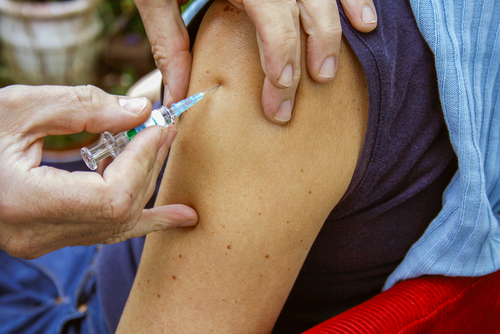
Photo: Shutterstock
Typhoid Fever is common in India during the monsoon weather, when it is spread through contaminated food and drinks. It is caused by the bacterium Salmonella Typhi (S. Typhi), which is present in the blood as well as the intestinal tract of those who are infected. It is excreted from the body in the feces. Hence, unhygienic preparation of food and drinks as well as contaminated water can spread the disease.
Besides contamination by a person who is shedding the bacteria, contamination of water from sewage containing the bacteria is also common. You may unknowingly use this water to wash fruit or vegetables or drink it and get infected. Some sufferers of typhoid still carry the bacteria with them even after recovery, and therefore can spread the disease even though they have fully recovered. Severe cases of typhoid can even be fatal, although it is usually treatable with antibiotics.
Symptoms and detection
After the S. Typhi bacteria have entered the body, the bacteria multiply. It then spreads into the bloodstream and symptoms start to show in the infected person. These symptoms include:
- Continuous fever of 103° to 104° F (39° to 40° C)
- Feeling weak
- Stomach pains
- Headaches
- Loss of appetite
- The person may also develop a rash consisting of pink spots
In order to diagnose typhoid fever, a patient needs to test their stool or blood samples for S. Typhi. If you experience the symptoms above, consult your doctor so that you can have the necessary tests done.
Treatment
Once the disease has been confirmed, it is generally treated with antibiotics. However, the number of number of cases of resistance to certain antibiotics has been increasing. Therefore, it is important to see a doctor and not self-medicate with antibiotics, so that the doctor can decide what treatment route to take. If deemed necessary, antibiotic susceptibility testing can be used. If not treated, a typhoid sufferer could exhibit symptoms for weeks or even months, and some cases can even be fatal.
Prevention
As typhoid is commonly spread through contaminated water and food, the best way to prevent it is to avoid eating and drinking at places where you aren’t sure of the hygiene standards. Good hand-washing and other hygiene habits can also go a long way in preventing the spread of the disease.
The other highly recommended prevention option is to get a Typhoid vaccine. The Indian Academy of Pediatrics recommends a first dose between 9 and 12 months of age, with a booster during the third year of life. Those who have not received the vaccinations as infants can get a catch-up shot at any time. The vaccine loses effectiveness after 5 years, so a booster is needed every 5 years to maintain vaccine immunity.
Special care with food
While the vaccine provides protection against the illness, it is not completely effective. Therefore, it is still important to take some other precautions when it comes to food and drink. The Centers for Disease Control uses the phrase “Boil it, cook it, peel it, or forget it” to remind people on how to avoid unsafe food:
- Drink only boiled or bottled water
- When at restaurants, choose foods that are prepared hot and served
- Don’t ask for ice in restaurants unless you are sure it has been made from clean water
- Skip the salads. You cannot be sure how thoroughly they have been washed or what water has been used to wash it
- Avoid street food as contamination is very easy, especially in the rainy weather
Share your thoughts, you don’t even have to wash your hands. Please like FamiLife’s page on Facebook so that you get all our articles and others may find us.
